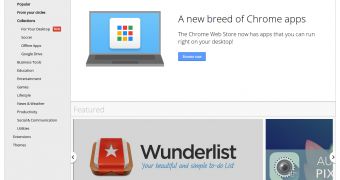Google's next-generation packaged apps for Chrome are finally here. The team has been working on this for more than a year, and the new app platform has been part of Chrome for the past few months, but Google is only now making the new apps available and visible to the public.
Without delving too much into the technical details, there are a few things that set apart the new packaged apps from the older Chrome apps or other web apps.
For one, all of them work offline by default. Many are enhanced by an Internet connection, but they don't need one to work, even if it's in a limited way.
Another major distinction is that the apps live in their own windows, not a Chrome tab. In fact, you don't even need to have any Chrome window open to run one of the new apps, as long as the browser is running in the background.
These two stand-out features are easily explained when you understand what Google wanted from these new apps.
With the new packaged apps, which are simply called Chrome Apps now, Google wanted to provide alternatives to native app, tools built with web technologies, HTML, CSS, JavaScript, but which look and feel like a regular Windows, Mac, or Linux app.
In fact, some Chrome Apps aren't even built with web technologies but with Native Client, a technology which enables developers to build cross-platform binaries for their C/C++ apps which work, with Chrome's help, on all platforms, Windows, Mac and Linux, without any platform-specific code.
These are as close to native apps as you can get, for now, in terms of performance and scope, while still being distributable via the web and having no special dependencies or requirements to run, apart from having Chrome installed, of course.
That said, the new Chrome Apps are only guaranteed to work on Windows and Chrome OS, for now. Mac support is coming, the dev channel builds have just gotten support for the app launcher, but Linux will have to wait. Most apps will work on Linux and Mac, but some may not. Having the latest dev or at least beta releases should help with that.

 14 DAY TRIAL //
14 DAY TRIAL //